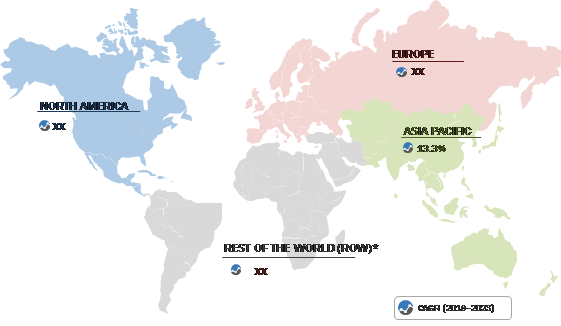Collagen peptides are the hydrolyzed form of collagen, where the complex long chains of hydrolyzed amino acids are made into short chains of amino chains called peptides. Short amino chains allow a high degree of bioavailability, thus helping peptides to pass through the intestinal wall into the blood stream easily. The market for taste modulators is estimated at USD 772.3 million in 2018; it is projected to grow at a CAGR of 11.6% from 2018, to reach USD 1.3 billion by 2023.
The collagen peptides market was led by North America owing to the presence of key market players as well as the established beverage industry in the region. Asia Pacific is the fastest-growing region in the collagen peptides market; it is projected to grow at the highest CAGR of 13.3% from 2018 to 2023. The region witnesses high growth due to the increased health awareness among consumers. China and India have witnessed major growth in the collagen peptides market, holding significant shares in the region. The growing population and developing food technologies directly influence the food & beverage industry in China and India. The high population growth rate will also create an opportunity for food ingredient manufacturers as the consumption levels are estimated to increase. The increasing emphasis on convenience, ready-to-eat, and value-priced foods by the working-class population has elevated the demand for health-based beverages, RTE cereals, dairy products, and meat & poultry products across globe. This, in turn, drives the demand for collagen peptides worldwide.
Download PDF brochure @ https://www.marketsandmarkets.com/pdfdownload.asp?id=248590980
COLLAGEN PEPTIDES ARE MOST WIDELY USED IN NUTRITIONAL PRODUCTS APPLICATIONS
Among the different applications, the nutritional products segment is estimated to dominate the collagen peptides market; it is also projected to grow at the highest CAGR of 12.2% during the forecast period. This is due to the increased health consciousness and consumer’s preference towards sports nutrition and dietary supplements; which, in turn, will surge the demand for collagen peptides, globally.
RISING CONSUMER’S INCLINATION TOWARDS HEALTHY LIFESTYLE TO STIMULATE THE GROWTH OF THE MARKET
Over the last few years, consumer awareness about healthy food products has been fueling the market for nutritive food products. Consumers are increasingly focusing on healthy aging, not only to increase their life expectancy but also to prevent and postpone the onset of diet- and bone-related diseases. According to the International Osteoporosis Foundation (IOF), osteoporosis causes more than 8.9 million fractures annually, which roughly translates to an osteoporotic fracture every three seconds, globally.
According to another study conducted by IOF, it is predicted that the number of Chinese population with osteoporosis and osteopenia will increase to 286.6 million by 2020 and 533.3 million by 2050. The incidences of hip fracture have already risen two to threefold in most Asian countries during the past 30 years. By 2050, more than 50% of all osteoporotic fractures will occur in Asia. With the rising consumer awareness related to collagen peptide and nutritional labels, there is a shift in demand from processed to nutritious and functional food. This shift in buying patterns has resulted in a higher demand for healthy foods and supplements, which, in turn, attracts various manufacturers to offer new food products that have functional properties. Consumer preference for healthy diets is witnessed due to the rising health concerns, coupled with changing lifestyles. This has led to an increase in the demand for collagen peptides for use in nutritional food products such as sports & nutrition food products, energy drinks, and protein drinks.
Speak to Analyst @ https://www.marketsandmarkets.com/speaktoanalyst.asp?id=248590980
WIDENING APPLICATIONS OF COLLAGEN PEPTIDES
Collagen production tends to decrease within the body with age and an unhealthy diet. Therefore, it has become one of the essential ingredients for developing healthy food. Consumers prefer to include collagen through their diet rather than collagen injections. Therefore, collagen peptides are being fortified into a variety of food & beverage products to improve their nutritional benefits.
Collagen peptides are widely used in various applications such as beverages, dairy, sports nutrition, snacks & cereal, meat & poultry, and personal care products. The wide applications of collagen peptides, coupled with the growing demand for functional food & beverage and sport nutrition products, drives the market growth. Numerous food formulations such as protein bars, protein drinks, yogurt drinks, dairy products, and various other fortified food products use collagen peptides to improve the elasticity, consistency, and stability of the products along with their health benefits.
KEY PLAYERS DOMINATING THE MARKET
The key players in the collagen peptides market include companies such as Darling Ingredients (US), Tessenderlo Group (Belgium), Cargill (US), Kewpie Corporation (Japan), and Danish Crown (Denmark), GELNEX (Brazil), GELITA AG (Germany), ITAGELATINE S.p.A (Italy), Lapi Gelatine (Italy), Nitta Gelatin (Japan), Weishardt Group (France), and Junca Gelatines (Spain). These companies have been focusing strategies such as expansions and acquisitions in order to meet the growing demand. For instance, in 2017, Tessenderlo Group (Belgium) company set up a collagen peptide production unit in Santa Fe (Argentina). It is expected to help the company expand its product line and meet the growing consumer demand for collagen peptide products in the global market. Also, in 2018, Darling Ingredients completed the acquisition of Kruger Commodities, Inc. (US). These strategies have helped the key market players to leverage operational revenues, sustain their position and meet the demands of customers in different regions.

